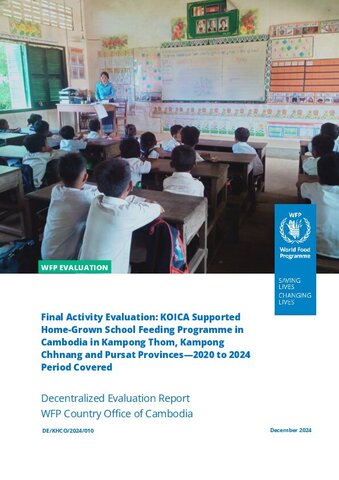
This decentralized end-line activity evaluation, commissioned by the Cambodia country office, is for the KOICA-supported Home-Grown School Feeding (HGSF) Programme in Cambodia, covering the period from March 2020 to August 2024.
The end-line activity evaluation was carried out in 2024. The evaluation was intended for both accountability and learning purposes. It focused on assessing the relevance, effectiveness, efficiency, impact, sustainability, coherence, and connectedness to provide valuable policy guidance to the government ministries involved in the National Home-Grown School Feeding Programme (NHGSFP) and to guide the design of the future phase of the KOICA-HGSF Programme and support inter-ministerial coordination for the successful implementation of the NHGSFP.
Key evaluation findings included:
- The HGSF Programme aligns with the NHGSFP and Cambodia's national strategies and is highly relevant to the priorities of the government concerning education, health, and nutrition for primary schoolchildren, and also supports local farmers.
- Both KOICA-supported and NHGSFP-managed schools largely met programme targets, with 93% of students satisfied with the school meals, though many said they would still attend without meals.
- Local farmers and suppliers benefited from capacity-strengthening efforts, though many suppliers need more training on procurement and pricing, and only 28% of farmers received agricultural training, which was insufficient for long-term needs. While many women showed interest in becoming suppliers, the procurement process was often too complex.
- The project significantly improved the capacities of the Ministry of Education, Youth and Sport (MoEYS) and other ministries to manage NHGSFP, supported by policy frameworks and government funding, though subnational staffing challenges persist.
- Strong coordination between WFP, MoEYS, and KOICA enhanced efficiency, despite challenges like low pay for cooks and procurement issues. The programme positively impacted school attendance and enrolment, providing stable incomes for suppliers and farmers. It promoted gender equity but missed opportunities to advance women's empowerment due to undercompensated cooks.
- The HGSF Programme had a significant positive impact on target communities, particularly in improving school attendance and enrolment rates. However, there is no direct evidence presented on its impact on children's growth, reduction of illness, or learning outcomes. The programme promoted equal access for both girls and boys, as well as women and men. Around 70% of farmers and traders involved in the programme are women.
- The HGSF programme is likely to continue beyond the project timeline due to alignment with government strategies and financial support. School staff have gained new skills, and community backing strengthens sustainability. However, resource constraints, particularly in monitoring, may affect long-term sustainability. Successful ownership relies on community engagement and capacity strengthening. The programme contributed to the transition to NHGSFP, with key achievements like the National School Meal Policy and increased government budget, but meal stipends remain insufficient. Continued WFP technical assistance is needed for NHGSFP’s effectiveness and sustainability.
Key recommendations from the evaluation included:
- Support the national government in exploring different school feeding models, ensuring cooks receive fair remuneration.
- Contribute to a smooth transition to government management by embedding experts within relevant government offices.
- Provide technical, administrative, and financial support to the National School Feeding Committee (NSFC) once members are assigned.
- Pilot and document different procurement models to inform government decisions and support smallholder farmers.
- Redesign and hand over market monitoring to the MAFF, ensuring sustainability.
- Collaborate with stakeholders to ensure a gender-responsive approach for all school feeding activities.
- Advocate for sustainable financing mechanisms for the school feeding programme, including food provision and cook compensation.
- Ensure monitoring indicators for the next KOICA phase are specific, disaggregated, and easily measurable.
